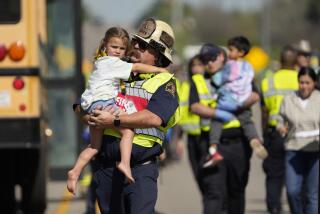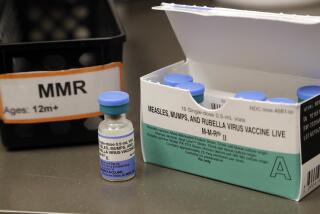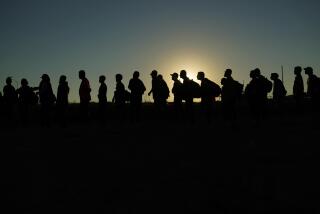Dallas Ebola patient flew United; airline says ‘zero risk’ of infection
Five elementary, middle and high school students who had contact with a man diagnosed in Dallas with Ebola are being monitored, Texas officials said Wednesday, as the search was underway for people who may have been exposed to the deadly virus.
The children, who attend four different schools, were in class earlier in the week but show no symptoms of the disease and will be monitored at home, officials said.
The patient, Thomas Eric Duncan of Liberia, arrived in the U.S. on Sept. 20 to visit family and developed symptoms four days later, said health officials and a Liberian community leader in Dallas.
He sought care late Thursday at Texas Health Presbyterian Hospital, where an emergency room nurse asked whether he had traveled to West Africa and was told that he had, Dr. Mark C. Lester, a hospital network executive, told reporters.
“Regretfully, that information was not fully communicated throughout the full team,” Lester said. “As a result, the full import of that information wasn’t factored into the clinical decision-making.”
At the time, the patient had a low grade fever and abdominal pain and was not exhibiting symptoms specific to Ebola, the hospital said in a statement. The man was sent home with antibiotics.
He was brought back to the hospital in an ambulance Sunday and placed in isolation, officials said. Tests confirmed Tuesday that he had contracted the Ebola virus. He was listed in serious but stable condition.
The patient told authorities that he flew part of his trip on United Airlines, the company said in a statement Wednesday.
The statement quoted the U.S. Centers for Disease Control and Prevention as saying that there was “zero risk of transmission” on any of the flights because the patient was not symptomatic at the time. But it said it would provide information about the flights, based on details provided by the CDC.
The patient is believed to have traveled on Flight 951 from Brussels to Dulles International Airport in Virginia, and on Flight 822 from Dulles to Dallas-Fort Worth.
Brussels Airlines operates direct flights from Monrovia, the Liberian capital, to Brussels, but the airline told reporters Wednesday that it had not been contacted by the CDC. It said it was in touch with international health authorities such as the World Health Organization and had implemented a number of precautionary measures since the beginning of the crisis.
The WHO has urged airlines to continue service to Ebola-stricken countries, saying travel bans were making it difficult to fly in desperately needed supplies and personnel.
Stanley Gaye, president of the Liberian Community Assn. of Dallas-Fort Worth, said Duncan came to Dallas to visit his fiancee. He declined to provide the woman’s name, but said that she has two children at home.
Gaye spoke to the woman Wednesday and said she was at home, watching the news. “She’s upbeat. She’s doing well,” he said.
News of the Ebola case has spread fear in Dallas, where many said they were worried about the public health implications.
Mike Miles, superintendent of Dallas Independent School District, said additional health professionals were being deployed to the affected schools to help keep an eye on students and identify any who might be showing flu-like symptoms. He added, however, that odds were small that children would have contracted the virus from the students under observation because those students were not symptomatic.
Officials emphasized that the virus is only spread through direct contact with the bodily fluids of patients, and that patients are not contagious until they develop symptoms.
At a midday news conference, Gov. Rick Perry assured Texas residents that state authorities were doing everything possible to ensure that they were fully protected from the virus.
“This is all hands on deck. We understand that,” he said.
David L. Lakey, commissioner of the Texas Department of State Health Services, said Duncan had an entire ward and care team dedicated to him. “They’re doing it in a very safe and compassionate environment,” he said.
He emphasized that conditions in the United States were very different than in West Africa, where the world’s worst Ebola outbreak is believed to have killed more than 3,000 people.
“This is not West Africa,” he said. “This is a very sophisticated city, a very sophisticated hospital, and the dynamics are so significantly different … that the chances of it being spread are very, very small. Unless somebody has symptoms, it’s not going to be transmitted to another individual.”
Public health teams are tracing between 12 and 18 people who came into contact with the patient after he developed symptoms and will monitor them for 21 days, the maximum incubation period of the virus.
Two paramedics and an intern who transported the patient to the hospital have been isolated at home and told to stay indoors, Dallas Fire-Rescue Department spokesman Jason Evans said. They will be monitoring themselves for symptoms, as well as receiving visits from federal, county and department officials for 21 days. The ambulance used has been taken out of commission, local news reports said.
Federal officials have said that the patient’s temperature was checked when he boarded a commercial airliner on Sept. 19 and he did not have a fever.
A CDC official in Monrovia said experts were sent to the airport to “see if we missed something.” So far, it appeared that the screening procedures developed in cooperation with the United States were working, said Tom Kenyon, director of the CDC’s Center for Global Health.
“This was not a failure of the screening processes at the airport. It’s a reality of the epidemic that we face,” he said. The more the epidemic spreads, the greater the risk the virus will be imported to the U.S.
An apartment building near Texas Health Presbyterian became the center of attention in the Ebola scare on Wednesday as reports circulated that the patient stayed there with family before being taken to the hospital. Evans confirmed that paramedics responded to a call about 9:28 a.m. on Sunday in the 7200 block of Fair Oaks Avenue.
Elizabeth Rayo, 24, said that she saw an ambulance arrive on Sunday at the Ivy Apartments, a complex on that block.
“I didn’t see them take anyone away,” she said. “I went inside. I figured somebody was sick.”
On Wednesday morning, she said, there were several Dallas police officers canvassing the complex, which consists of low-slung, two-story buildings arranged around courtyards.
Rayo said that she planned to leave that day. “I have kids,” she said. “I can’t afford to stay here.”
News crews surrounded the Ivy Apartments, about a mile from the Dallas hospital. Residents described the complex as a multi-ethnic community of Liberians, Nepalis and other nationalities in a neighborhood that one woman called the “Ellis Island of Dallas.”
Toni Gomez, 29, stood outside holding her 1-year-old daughter, Demauria Griffen. She said that people in the neighborhood were afraid to go near the hospital.
“My mother called me and said, ‘Do not go to Texas Health Presbyterian. You could catch Ebola.’ And I said, ‘Mama, that’s the closest hospital I can go to. What do you want me to do?’”
A woman with a Russian accent, who asked not to be identified, said the last 24 hours had been crazy.
“When I got back from English class before 3 p.m. yesterday, I hear the helicopters, fly, fly, fly,” she said. “I have no idea what they want with our community. Is somebody sick here?”
Patients being treated for other ailments at the Dallas hospital and their families have expressed concern about how officials are responding to the case and called for more information to be released about the individual infected.
The Dallas County Health and Human Services Department said it had issued new guidelines to health facilities, including placing posters at the entrance of all acute-care areas asking patients to immediately inform staff if they recently traveled internationally, and collecting travel histories from any patients who present with fever.
Health facilities were advised to place a surgical mask on anyone who reports travel to a country affected by the Ebola outbreak and to immediately escort the patient to a private room for medical evaluation, according to a statement posted on the county website.
Patients who were in those countries within the 21 days before they became ill, have a fever and other symptoms of the virus should be isolated and the case reported to county authorities, the guidelines say. Those symptoms can include a severe headache, muscle pain, diarrhea, abdominal pain or hemorrhage.
Some people who work near the sprawling brick hospital complex surrounded by leafy office parks said they were worried about the public health implications of the case.
Michael Akers, 38, who works at a nearby hospital sterilizing medical equipment, said he wanted to know what would be done with equipment used to treat Duncan -- and what would happen to others who may have been exposed to him once he was sick. He said he hoped officials would act fast to trace the patient’s movements.
“How did he get to the hospital?” Akers asked. “Because I’m about to take the bus.”
He and coworkers had been talking about the case the day before, and although they know the disease is not airborne, he said authorities needed to continue to provide information about the virus to quell rumors.
“All they can do is just educate folks. There’s always going to be somebody who’s skeptical,” he said.
Marquita Williams, 30, who was also waiting for the bus, was suspicious that more had not been done to stop the infection and was concerned “that it’s set to spread.”
She couldn’t understand how the patient made it to Dallas.
“If they know the cause is from West Africa, why aren’t they quarantining these folks before they come or sending the treatments over there?” she asked.
Williams, who works in a Texas Instruments manufacturing plant, had discussed the Ebola case with coworkers and read up on the disease overnight, so she knew that it can take days for patients to develop symptoms. But she still thought U.S. authorities should improve screening.
“I just hope they come up with some solution to contain it,” she said.
Waiting nearby for a light rail train, culinary student Michael Minter said he hoped the case increased local awareness of the Ebola outbreak in Africa.
“We tend to take for granted that this can’t happen in our city,” said Minter, 50. “He may not be the last one.”
Glionna and Hennesy-Fiske reported from Dallas and Zavis from Los Angeles. Christine Mai-Duc and Matt Pearce in Los Angeles and Robyn Dixon in Monrovia contributed to this report.
More to Read
Start your day right
Sign up for Essential California for news, features and recommendations from the L.A. Times and beyond in your inbox six days a week.
You may occasionally receive promotional content from the Los Angeles Times.









